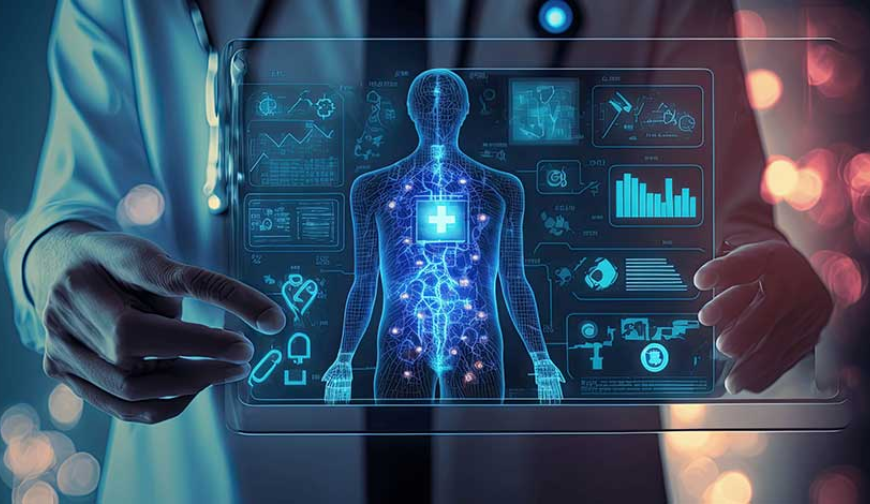In today’s rapidly evolving landscape of healthcare, artificial intelligence (AI) has emerged as a groundbreaking technology, particularly in the field of diagnostics. AI-powered systems are revolutionizing the way medical conditions are detected, diagnosed, and treated, offering unprecedented levels of accuracy, efficiency, and accessibility.
Introduction to AI in Diagnostics
AI in healthcare refers to the use of advanced algorithms and machine learning techniques to analyze complex medical data and assist healthcare professionals in decision-making processes. Over the years, AI has evolved from a promising concept to a tangible reality, with its applications spanning across various domains within diagnostics.
Applications of AI in Diagnostics
One of the primary applications of AI in diagnostics is in medical imaging. Advanced AI algorithms can analyze images from X-rays, MRIs, CT scans, and other imaging modalities with remarkable precision, aiding in the early detection of diseases such as cancer, cardiovascular conditions, and neurological disorders.
Moreover, AI enables predictive analytics, allowing healthcare providers to anticipate potential health risks and intervene proactively to prevent diseases before they manifest. By analyzing vast amounts of patient data, AI algorithms can identify patterns and trends that may indicate the onset of certain medical conditions, empowering clinicians to develop personalized treatment plans tailored to each patient’s unique needs.
Advantages of AI in Diagnostics
The integration of AI into diagnostic processes offers several advantages. Firstly, AI systems can significantly enhance the accuracy and efficiency of diagnosis, reducing the likelihood of human error and misinterpretation. Additionally, AI-powered diagnostics enable faster turnaround times, enabling patients to receive timely and effective treatment.
Furthermore, AI has the potential to address healthcare disparities by extending diagnostic capabilities to remote and underserved areas where access to specialized medical expertise may be limited. Telemedicine platforms equipped with AI algorithms can facilitate remote consultations and diagnostics, improving healthcare outcomes for populations in remote locations.
Challenges and Limitations
Despite its transformative potential, the widespread adoption of AI in diagnostics faces several challenges and limitations. Data privacy and security concerns remain a significant barrier, as the use of sensitive patient data raises ethical and regulatory issues regarding consent, confidentiality, and data protection.
Moreover, integrating AI systems into existing healthcare infrastructures poses technical and logistical challenges, requiring interoperability with electronic health records (EHRs) and other clinical systems. Additionally, regulatory frameworks governing AI in healthcare are still evolving, necessitating clear guidelines and standards to ensure the safe and ethical use of AI technologies.
Future Trends and Innovations
Looking ahead, the future of AI in diagnostics promises continued innovation and advancements. Machine learning algorithms will become increasingly sophisticated, capable of analyzing complex datasets with greater accuracy and efficiency. Moreover, AI will be integrated with other emerging technologies such as the Internet of Things (IoT) and wearable devices, enabling continuous monitoring and real-time feedback for proactive healthcare management.
Impact of AI on Healthcare Professionals
The integration of AI into diagnostic workflows will inevitably reshape the roles and responsibilities of healthcare professionals. While AI systems can augment clinical decision-making and automate routine tasks, healthcare professionals will need to acquire new skills and competencies to effectively leverage AI technologies in their practice.
Ethical Considerations
As AI becomes more prevalent in healthcare, ethical considerations surrounding its use become paramount. Bias in AI algorithms, lack of transparency, and issues related to patient consent and autonomy must be addressed to ensure that AI-driven diagnostics remain fair, accountable, and trustworthy.
Conclusion
AI holds immense promise for revolutionizing healthcare diagnostics, offering unparalleled opportunities to improve patient outcomes, enhance clinical decision-making, and increase healthcare accessibility. However, the responsible and ethical implementation of AI technologies is crucial to realize their full potential and address the challenges and limitations associated with their use.
FAQs
- Is AI in diagnostics reliable?
- AI-powered diagnostics have demonstrated high levels of accuracy and efficiency in numerous studies and real-world applications.
- What are the ethical concerns associated with AI in healthcare?
- Ethical concerns include bias in algorithms, patient privacy issues, and ensuring transparency and accountability in AI-driven decision-making processes.
- How can AI improve healthcare accessibility?
- By enabling remote diagnostics and telemedicine, AI can extend healthcare services to underserved and remote populations, reducing disparities in healthcare access.
- What role do healthcare professionals play in AI-driven diagnostics?
- Healthcare professionals play a crucial role in leveraging AI technologies to enhance clinical decision-making, requiring ongoing training and upskilling to effectively integrate AI into practice.
- What are the future trends in AI diagnostics?
- Future trends include advancements in machine learning algorithms, integration with IoT and wearable devices, and the development of predictive analytics for proactive healthcare management.
